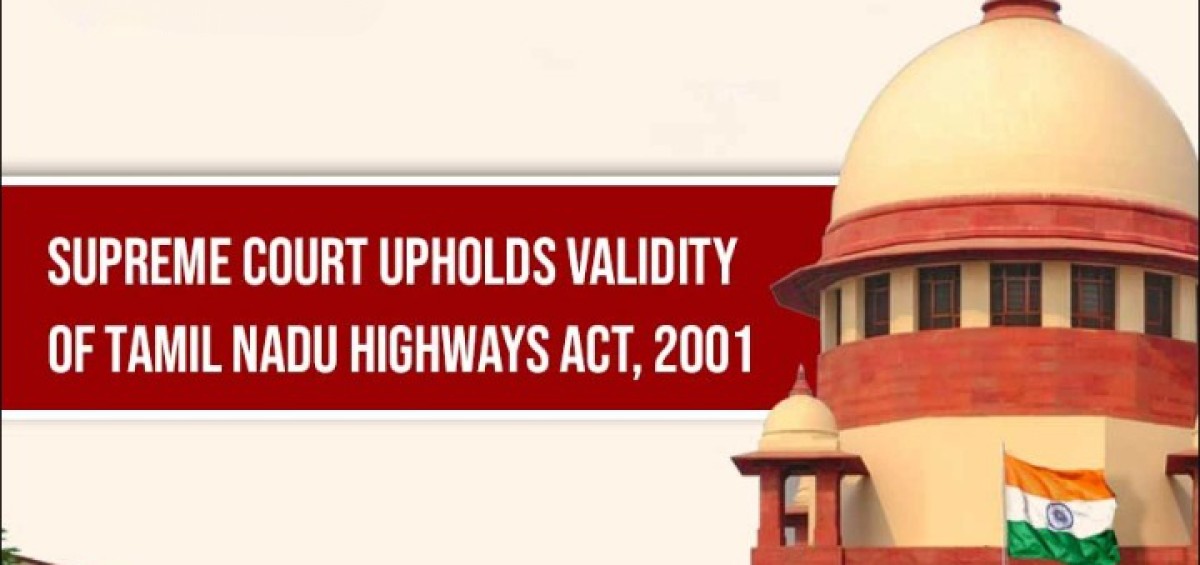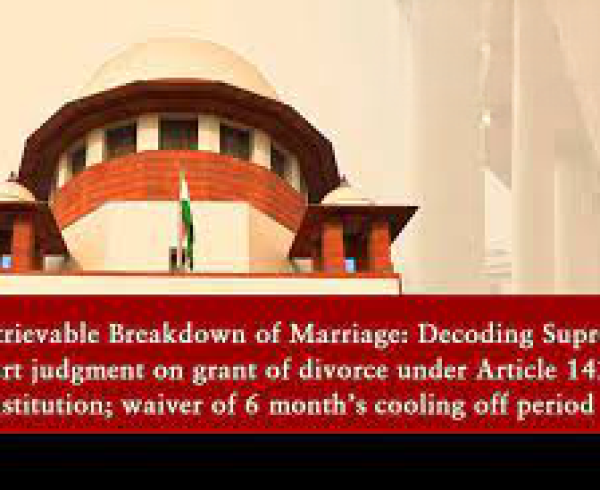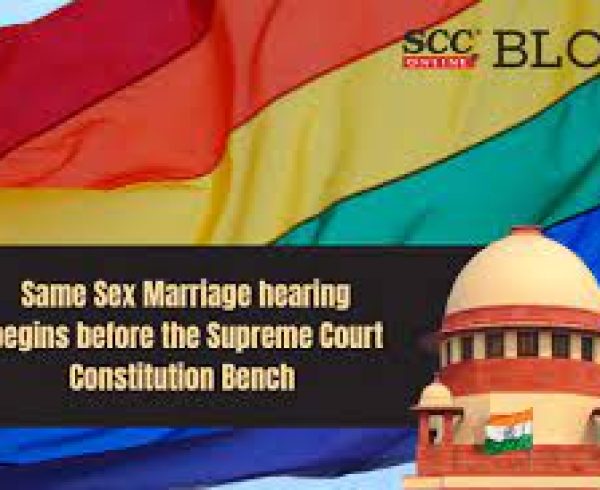The Supreme discussed the very foundation of Article 254(2) of the Constitution and commented that comparing two legislations of State and Centre would be akin to comparing chalk and cheese, i.e., two essentially unequal entities.
Supreme Court: In a batch of Civil Writ Petitions challenging the validity of Tamil Nadu Highways Act, 2001 on the ground of manifest discrimination or arbitrariness as compared to the provisions of the ‘Right to Fair Compensation and Transparency in Land Acquisition; Rehabilitation and Resettlement Act, 2013’ (‘New LA Act’), the Division Bench of Dinesh Maheshwari and Sanjay Kumar, JJ. upheld the validity of Tamil Nadu Highways Act 2001.
Getting into the facts, Tamil Nadu state acquired land for Harijan Welfare Schemes, industrial purposes and highways by deviating from the law and procedure prescribed in the Land Acquisition Act, 1894. The State enacted ‘Tamil Nadu Acquisition of Land for Industrial Purposes Act, 1997’, ‘The Tamil Nadu Acquisition of Land for Industrial Purposes Act, 1997’ and ‘The Tamil Nadu Highways Act, 2001’ while exercising its concurrent power under Entry 42 in List III of Seventh Schedule to Constitution of India, which received the President’s assent in 1978, 1999 and 2002. However, with the introduction of the New LA Act, the said State Acts were rendered void.
Section 105 of the New LA Act clarified that the legislation would not apply to or apply with modifications to the other Central laws related to land acquisition. On a similar note, the State Legislative Assembly passed Bill 5 of 2014 on 22-2-2014 to insert Section 105-A by amending the New LA Act, making the provisions inapplicable or applicable with modifications to the Acts relating to land acquisition in Tamil Nadu, which received the President’s assent on 1-1-2015.
Thus, Right to Fair Compensation and Transparency in Land Acquisition, Rehabilitation and Resettlement (Tamil Nadu Amendment) Act, 2014 (Act No.1 of 2015), came into force with retrospective effect from 1-1-2014. The same was challenged before Madras High Court through a batch of Writ Petitions. Other Writ Petitions were filed for challenging Tamil Nadu Highways Act, 2001, Tamil Nadu Acquisition of Land for Industrial Purposes Act, 1997 for being ultra vires of the Constitution of India. They also sought directions to the authorities to drop the acquisition of petitioners’ lands.
The High Court declared the three State Acts void and held that Section 105-A did not resurrect them and was a mere dead letter and held that Section 105-A(2) and (3) to be mandatory. The High Court did not reopen the acquisitions made on or after 27-09-2013 under the State Acts where the acquired lands had already been used for the purpose of acquisition. During pendency of Special Leave Petitions before the Supreme Court, the State again attempted to revive the said Acts by enacting ‘The Tamil Nadu Land Acquisition Laws (Revival of Operation, Amendment and Validation) Act, 2019’, which received President’s assent on 2-12-2019 and came into force retrospectively from 26-9-2013. Its validation was upheld in G. Mohan Rao v. State of T.N., (2022) 12 SCC 696.
Considering the said case, the Court held the challenges against Act 1 of 2015 and Section 105-A redundant and considered the issue of validity of Industrial Purposes Act and the Highways Act owing to inherent arbitrariness and infringement of Article 14 of Constitution of India. The Court pointed that the two petitioners in the instant matter purchased land well after the initiation of the acquisition proceedings, but the notice under Section 3(1) of Industrial Purposes Act was published in the Gazette after their purchase of the lands in question in March 2013 before the New LA Act coming into effect. The Court considered the question of locus standi of the petitioners as per Shiv Kumar v. Union of India, (2019) 10 SCC 229 challenging provisions of Industrial Purposes Act and the proceedings, who purchased their lands after initiation of land acquisition proceedings.
The Court observed that “since the two petitioners seek to assail the validity of the Industrial Purposes Act only in the context of the acquisition proceedings initiated thereunder in relation to the lands purchased by them after issuance of the Public Notice under Section 3(2) thereof, viz., the equivalent of a Notification under Section 4 of the old LA Act, their challenge is tainted and unacceptable in its very inception.” In addition, the original owners of subject lands raised objections against Public Notice under Section 3(2) in 2007 but chose to sell their lands in 2012 and 2013, they cannot be permitted to claim ignorance of acquisition proceedings. The Court held that “Mere passage of time and publication of the Section 3(1) notice after their purchase of the lands would not save their sale transactions or vest them with a right to attack the acquisition.” The Court therefore dismissed the challenge against the Industrial Purposes Act for arbitrariness and violation of Article 14.
The Court discussed the very foundation of Article 254(2) of the Constitution and commented that comparing two legislations of State and Centre would be akin to comparing chalk and cheese, i.e., two essentially unequal entities. The Court went through a catena of cases dealing with repugnancy between a State Act and Central Legislation. The Court referred to U.P. Avas Evam Vikas Parishad v. Jainul Islam, (1998) 2 SCC 467 having similar facts wherein, the Court held that if the provisions of Land Acquisition (Amendment) Act, 1984 were inapplicable to acquisitions under the 1965 State Act, the provisions of the old LA Act made applicable under the 1965 State Act would be void on the ground of repugnancy under Article 254 of the Constitution. Even in Savitri Cairae v. U.P. Avas Evam Vikas Parishad, (2003) 6 SCC 255, the Court observed that “Article 14 of the Constitution cannot be invoked for enforcement of a State legislation vis-à-vis Parliamentary legislation and/or legislation of another State.”
The Court refused to entertain the challenge against Highways Act while pointing out that the Highways Act in Tamil Nadu stood protected even at the time of old LA Act owing to the President’s assent under Article 254(2) of Constitution and continued to operate and provide altogether different yardsticks for acquisition of land and payment of compensation till the advent of the new LA Act.
The Court observed that new LA Act advocates timely measures being adopted in implementation of the acquisition and such general temporal restrictions would benefit the land owners, but the absence of such restrictions in the Highways Act may not be reason enough to invalidate it, as the very premise on which the Highways Acts was enacted by the State of Tamil Nadu was to cut down on time-consuming processes. It further added that the Highways Act does not intend that the processes for acquisition of land should be protracted or be ridden by avoidable delays.
The Court clarified that the matters pending before Madras High Court for individual acquisition proceedings by the two petitioners have to be considered on their own merits without reference to the instant adjudication which was limited to the validity of Highways Act. It further said that Sections 3, 7 and 11 of the Validation Act expressly exclude the new LA Act, therefore, the State government would be bound to apply only the Highways Act for acquiring lands for the said purposes.
[C.S. Gopalakrishnan v. State of T.N., 2023 SCC OnLine SC 598, decided on 9-5-2023]
Source Url:






Leave a Comment